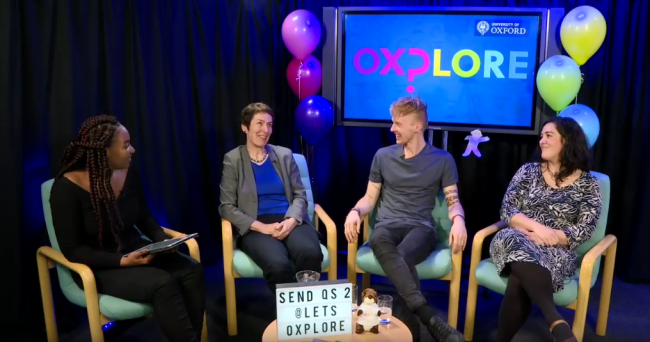Would it be better if we all spoke the same language?

The idea of everybody speaking the same language is not novel, and neither is the notion that this would have significant practical benefits. Indeed, the usefulness of a common language shared by all people is one of the ideas that lie behind the design of languages such as Esperanto, but also behind Star Trek’s universal translator device. A universal language would clearly resolve the huge range of communication problems that are caused by language diversity. So why has this solution not yet been universally implemented?
This issue was at the heart of the Big Question asked in the context of a live-streamed event organised by the outreach initiative Oxplore: Would it be better if we all spoke the same language? The event brought together presenter Miya Madovi, a first-year undergraduate student in Spanish and Linguistics; Katrin Kohl, Professor of German Literature and Lead Researcher of the Creative Multilingualism research project; Marianna Bolognesi, Postdoctoral Researcher within the Creative Multilingualism Metaphor strand; and Tom Crawford, Tutor in Maths at St Hugh’s College.
Miya kicked off the debate by tackling an even more fundamental question that has been a focus of many discussions, despite appearing simple at first: What is language? One might choose a seemingly straightforward answer – that language is a system of symbols we use to convey meaning. However, the boundaries of language are very fluid. For instance, in the UK there are many Scottish dialects with varying levels of mutual intelligibility that are still all labelled as dialects rather than languages. A different view comes from maths. As language is a way of communicating with symbols, mathematical formulae like Pythagoras’ theorem can also be seen as part of language, since they are universally understood and used to get across information. As Tom Crawford argued, the language of maths can – and should – be considered universal as it is the language of universal concepts describing the universe around us.
However, in terms of natural language (a language that developed naturally as a means of communication between human beings), there is no such thing as one universal language, though one might claim that having one could be useful. Therefore, an interesting question arises: What is the point of speaking more than one language? To answer this question, Katrin Kohl pointed to research which shows that speaking more languages can make us more adaptable. Even English-only speakers in the UK will switch between different varieties of English depending on whom they are talking to (their teacher, friend, grandmother etc.), and this skill will become ever more important in the process of globalisation.
Similarly, a much discussed question is this: Are people who speak more languages smarter than monolinguals? Marianna Bolognesi pointed out that this question is often framed inappropriately – we should be asking whether there are any cognitive benefits in speaking more languages. She continued by explaining that there are studies showing that bilinguals have more control of the attention system and that bilinguals are on average diagnosed with dementia four to five years later than monolinguals. In addition to this, there are social benefits, and there is some evidence to suggest that bilinguals tend to be more creative.
The debate also had an interactive side with challenging questions from the audience. For instance, one viewer asked if we can really say that maths is a language when it does not convey meaning. Tom Crawford suggested that even though maths differs from spoken languages, it is a universal written language, a system of symbols that convey meaning. Marianna Bolognesi addressed the question of whether speaking only one language would destroy diversity and take away who we are. She pointed out that people who speak different languages have multilingual identities, and that this is a very important part of who we are. It follows that if multilingualism is preserved, we also preserve a richer variety of identities.
To wrap up, the debaters oxplored the Big Question. While it might be claimed that we already all have a universal language – the language of maths – most people would find that a rather restrictive medium of communication. When it comes to natural language, speaking the same language would reduce our creative scope and innovativeness, and it would press us all into the same mould. Knowing different languages allows us to give expression to different cultural identities and it keeps us in touch with our heritage.
Watch the Oxplore discussion on YouTube
Where next?
Poetry workshops: celebrating community languages
Does the image of Germans in the UK press affect whether pupils want to study the language?
“Reader, I went through a wedding ceremony with him”: Translating Jane Eyre